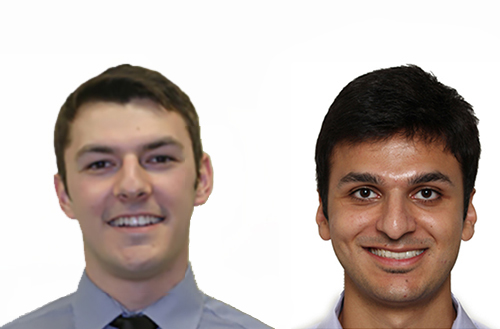
Regina students at the heart of conference awards
The Dean’s Summer Research Project has opened the doors to a love of clinical research
By Amanda WoroniukDanny Meyer and Abdalla Butt may be undergraduate students in the College of Medicine, but they were at the heart of the Canadian Society of Vascular Surgeons (CSVS) conference held this past September in Halifax, where the pair took top honours for their research.
Meyer, a third-year student at the college’s campus in Regina, received the Josephus C. Luke Award, recognizing the best clinical or basic research abstract presented at the annual meeting.
Meyer shared a bit about his experience, explaining that his paper focused on research that was conducted for a Dean’s Summer Research project in the summer of 2015. Given the significance of the award and considering the company he was in at the conference, Meyer was surprised to take home the award.
“It feels incredible. I wasn’t considering myself to be that strong because there were such senior researchers,” said Meyer. “I knew I was eligible, but was surprised when I heard my name; all the hard work I put into it made it meaningful.”
Hard work is nothing new for Meyer. In addition to working with Dr. Nermeen Youssef to complete his Physician Recruitment Agency of Saskatchewan Rural Externship Program (PREP) over the summer, he’s involved with the Student Medical Society of Saskatchewan (SMSS) for the third straight year.
Meyer’s paper, Investigating factors that delay carotid endarterectomy (CEA) in patients with symptomatic carotid artery stenosis, was his first opportunity to pen a research paper.
“Generally when people have a stroke or stroke-like symptoms, there are several reasons,” he explained. “Plaques within the carotid arteries of the neck are an important cause of stroke in Canada and worldwide.”
Meyer described that the research goals were to identify the proportion of patients who had the plaque surgery within the suggested two-week timeframe following a stroke, and for those who didn’t, identifying the factors that led to a delay in surgery.
Meyer reviewed six years of data from patients in Southern Saskatchewan and found that only a third who exhibited stroke symptoms met the 14-day guideline to have surgery. He found two factors were significant: the type of symptom first experienced, the more severe, the more likely they could have surgery; and the setting in which the patient initially presents to (i.e the emergency department versus outpatient clinic).
While the reason for this wasn’t clear, Meyer acknowledged that the finding were consistent with results elsewhere in the world and further study needs to be done, which could take the form of working with other health professionals.
“The next step is to put these findings into action and try to change practice,” added Meyer. “In order to fix these issues, we could reach out the Heart and Stroke Foundation of Canada who run the FAST Campaign.”
While this opportunity gave him a chance to experience research first-hand, Meyer hasn’t settled on a specialization yet.
“In the future I undoubtedly plan to include clinical research in my career no matter the specialty I end up choosing.”
“I believe that the College of Medicine is taking excellent steps in order to provide a phenomenal education and great opportunities for its students,” said Meyer. “Opportunities like the Dean’s Summer Research Projects are one of such opportunities and for me opened the door to a love of clinical research.”
Like Meyer, Abdalla Butt is also a third year Regina-based medical student, who worked with Dr. Kopriva for his Dean’s Summer Research Project. Butt won the Sigvaris President’s Award at the CSVS Conference, which recognized the most outstanding abstract dealing with venous disease.
Butt’s research Economic Implications of Publically Funded Endovenous Saphenous Vein Ablation (EVA), looked at the cost of two publicly-funded procedure options to treat varicose veins: the older and invasive surgical stripping technique, and the less-invasive endovenous ablation technique. While the former requires several days of recovery, the latter is a same-day procedure performed in an outpatient setting.
“My supervisor, Dr. Kopriva, and I wanted to submit our research project to this conference because we knew it would spark a lot of debate and discussion,” Butt explained about why he chose his topic. “This research topic has never been addressed, prior to our research, in the research community.”
He went on to add that Saskatchewan is the only province in Canada to publicly fund medically necessary varicose vein treatment. In other provinces, the procedure is done in private clinics, making it expensive for patients who want it done.
Butt’s research found that the endovenous ablation method was a more cost-efficient option because it didn’t require an overnight hospital stay. He added that there’s an opportunity for other provinces to embrace the endovenous ablation method as the varicose vein treatment standard, and to publicly fund it, allowing greater access for patients.
“It challenges the framework of privatization and publicly-funded healthcare systems,” commented Butt. “We understand that public healthcare comes at the cost of tax-payer dollars, while privatization impairs many patients financially from getting a treatment they may need or want. However, this research shows that providing public healthcare dollars for endovenous ablation is actually cheaper than the surgical stripping, which was the previous go-to treatment option, hence should be publicly funded.”
What’s next for Butt in terms of his medical career? He’s leaning toward surgery, but is also equally excited about future research and additional Dean’s Summer Research Project possibilities.
“While I don't want to jinx my chances in any specialty, I think I am certainly leaning towards surgery because I see myself as a hands-on guy who loves the operating room,” said Butt. “Winning this award certainly shows that vascular surgeons appreciate my work, hence, vascular surgery probably would make a good contender for my surgical specialty.”
